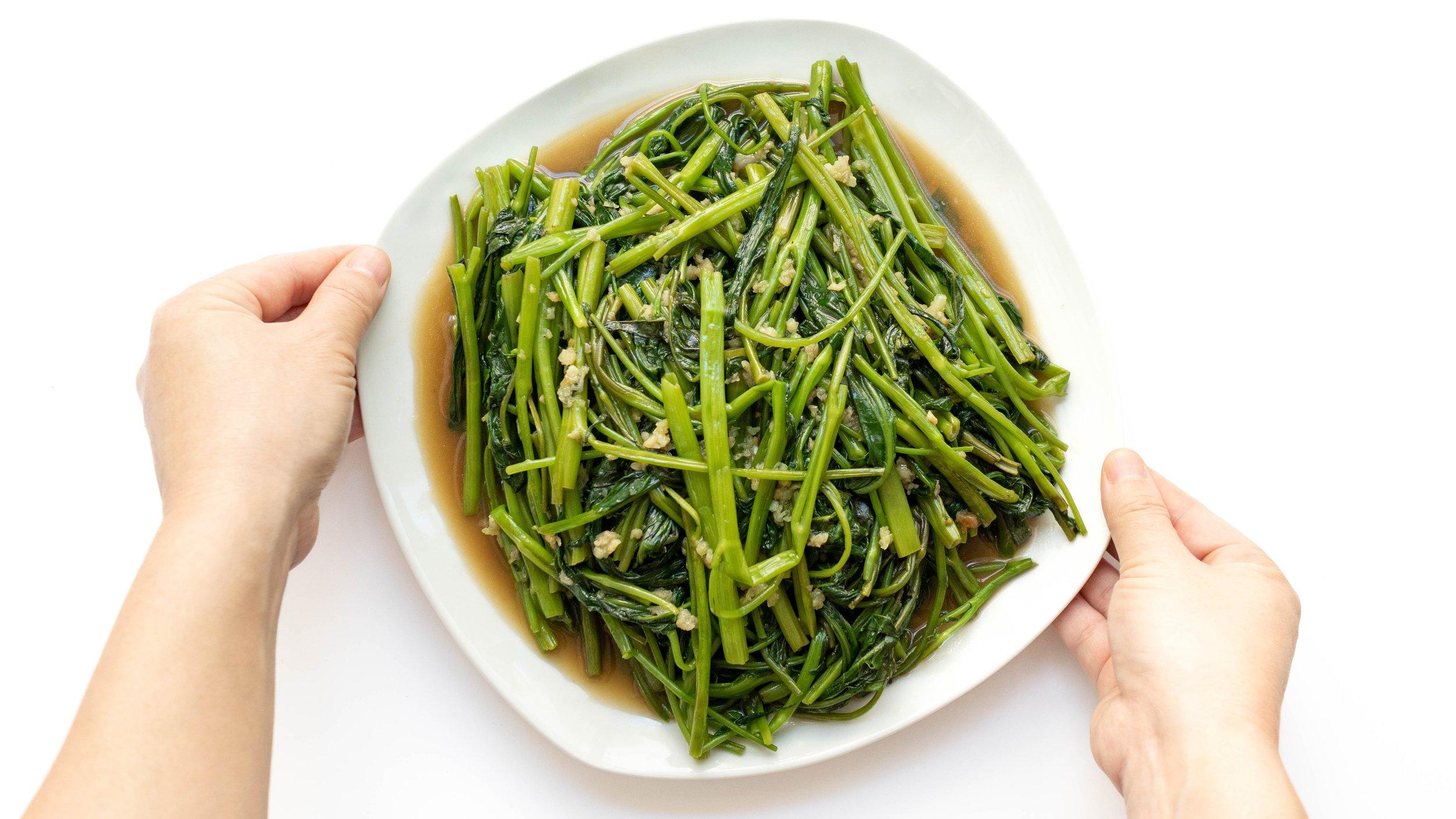
Simple Water Spinach and Garlic Stir Fry (Rau Muong Xao Toi)

This classic Vietnamese vegetable side dish goes wonderfully with steamed rice. Preparations are simple. Snap water spinach into manageable pieces then quickly stir fry with a little oil, lots of garlic, oyster sauce, and a bit of sugar. Serve with a protein side dish (options listed below) and you have yourself a complete and tasty family-style meal.
What is Water Spinach
Water spinach (known as rau muống in Vietnamese) is a popular Southeast Asian semi-aquatic vegetable. It also goes by the name morning glory, Asian water spinach, Chinese water spinach, swamp spinach, river spinach, morning glory, ong choy in Cantonese, kangkong or kangkung in the Tagalog, or more scientifically, Ipomoea aquatic.
Water spinach is a long, leafy green vegetable with hollow stems. This leafy green is similar to spinach, except the stem is thicker, longer and hollow. The leaves are arrow-shaped, and both leaves and stems are edible. However, it’s the hollow shoots that are the most prized. In an ideal tropical climate, it grows aggressively like a weed in moist soil and it doesn’t require much care.
Where to Buy Water Spinach
Here in the US, water spinach is available in many Asian/Chinese/Vietnamese grocery stores. They are available year-round, but you can find them the least expensive in early summer. I purchased a 2-lb bunch for about $4, which was a steal. In the fall and winter months, you can find water spinach, but it will be quite expensive. I once bought a bunch of water spinach for $12 but it was much too late to turn back.

How to Prep Water Spinach
Before you unwrap the rubber band and plastic bag that it comes in, trim about 1 inch off the fibrous ends with a knife. One by one, hand snap the water spinach with your fingertips into 5-inch segments or smaller, depending on the size of your skillet. Separate the stems from the leaves, as they require a bit more cooking, but this is entirely optional. Wash the water spinach thoroughly by soaking them in a large tub of cold water. Make sure to lift the water spinach out of the water each time to leave sand and dirt behind. Change the water and repeat, as needed.
How to Cook Water Spinach
Water spinach will cook down to a much smaller volume, just like spinach. It will quickly go from “Oh no, that’s way too much” to “where the heck did it go?” It’s also best to cook this with a tiny bit of water in a covered skillet to steam and cook the water spinach without too much tossing. Cooking water spinach for too long in a lot of water will quickly turn the vegetables a dull brown color and leave the leaves a slimy texture, much like overcooked regular spinach.
For the best and most texturally favorable result without any guesswork is to blanch the water spinach in boiling water for about two minutes. Immediately transfer blanched water spinach to an iced bath to stop the cooking. Drain completely and squeeze out the excess water with your hands. The only downside is cold water spinach. In the below recipe, I’m keeping it simple and sticking to cooking it with a bit of water in a covered skillet.
How to Grow Water Spinach
In the right climate, you can easily propagate the plant by its cuttings. Place a tubular shoot in water and it will root along the nodes. Once that happens, transfer to moist soil. I haven’t had much luck propagating water spinach from cuttings, nor planting from seeds so I don’t have any real-world experience to back this up. Until the gardening Gods bless me with greener thumbs, I’m content with purchasing water spinach from the store.

What You Will Need
Water Spinach - Of course. These are sold in large 2-pound bunches at most Asian grocery stores in the US, starting in early summer. They are easy to discern. Look for a bunch of long stalks (up to 20 inches) that a beauty contestant would be seen holding. It’s usually wrapped in plastic like a bouquet and tied together with a large rubber band.
- Oyster sauce — Provides a salty umami flavor.
- Sugar — Balances the saltiness of the oyster sauce.
- Garlic — Provides great aroma and flavor.
- Corn starch — Optional to thicken the small amount of liquid.

Pair the Dish for a Complete Meal
Serve this water spinach stir fry with steamed rice and one other protein dish for a complete meal:
- Caramelized Pork Spare Ribs (Suon Khia or Suon Ram Man)
- Caramelized and Braised Pork Belly with Eggs (Thit Kho Tau)
- Ginger Chicken (Ga Kho Gung)
- Crispy Salt & Pepper Beef (Thit Bo Chien Muoi Tieu)
- Bitter Melon and Eggs (Kho Qua Xao Trung)
- Lazy Pan-Fried Lemongrass Pork Ribs with Sweet & Savory Glaze
- Caramelized Shrimp (Tom Rim)
- Easy Pan-Fried Tofu & Eggs (Dau Hu Trung Chien)
Optional Dipping Sauces
You don’t really need any dipping sauces for this side dish, as it is already seasoned. However, if you prefer a dipping sauce, you can use any one of the below three sauces.
Fish sauce — My favorite. To a small bowl, add a tiny bit of fish sauce, straight out of the bottle, with sliced red chili peppers.
Soy sauce — Don’t like fish sauce? You can replace fish sauce with soy sauce instead. Use your favorite light soy sauce. Add sliced red chili peppers for a spicy kick.
Vietnamese Fish Sauce Dipping Sauce — You can also serve this with a less pungent and a more prepared version of fish sauce, nuoc mam cham, also known as the mother sauce of Vietnam.
Print
Link nội dung: https://giaidap.edu.vn/rau-xao-a74727.html